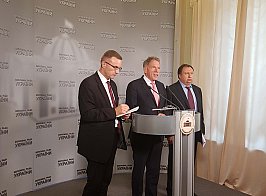International activity
Rejection of NATO membership for Ukraine will push Russia to attack the Alliance itself, Ivanna Klympush-Tsintsadze

After the end of the Cold War, the North Atlantic Alliance was in
anabiosis, naively thinking that the threat has disappeared. Only Russia's
attack on Ukraine in 2014 to some extent forced NATO to start reviewing
its place in geopolitics and explore mechanisms to respond new challenges.
Ivanna Klympush-Tsintsadze, Chair of the Committee on Ukraine's
Integration into the EU, said this during the lecture ‘Necessity and ways
to transform NATO in the new geopolitical context’ held for students of 47
higher education institutions. ‘Serious changes began only with the start
of the full-scale war in February 2022. But they were not fundamental.
These were changes, first of all, in communication – from the message that
this was not a NATO war, to the message that Ukraine should be supported
as much as possible, but only to the extent that would not drag the bloc
into this war. Until now, the desire to avoid escalation hindered many
processes in support of Ukraine,’ she said.
Russian aggression exposed certain problems in NATO. ‘I ask myself a
question: Can an organisation created as a military-political bloc be
unprepared for a war? It turns out that it can. This applies not so much
to Ukraine, but, first of all, to the fact that the war required
reassessment of capabilities within the Alliance. Moreover, the countries
on NATO's eastern flank are concerned about the extent to which Article 5
is an unambiguous, clear guarantee of security for each member of the
Alliance,’ Ivanna Klympush-Tsintsadze said. She emphasised that NATO
should realise that resting on its laurels after the collapse of the
communist bloc was a big mistake: ‘The Rammstein format (which is
certainly extremely important for us) demonstrated that NATO's mechanisms
need serious improvement to effectively address challenges outside its
territory. Now it is important to find common answers to the question, how
the Alliance can change, to be able to address challenges both outside and
inside NATO.’
At the same time, the Chair of the Committee is convinced that there is no
other guarantee of security for Ukraine, apart from membership in NATO,
despite all the difficulties that this organisation faces. ‘Ukraine's
entry into the Alliance will strengthen it and for many decades will repel
Russia's wiliness and ability to attack not only Ukraine, but also the
Alliance itself. If things turn out differently, it will encourage Russia
first to hybrid, and then to direct attacks on NATO,’ Ivanna
Klympush-Tsintsadze emphasised.

